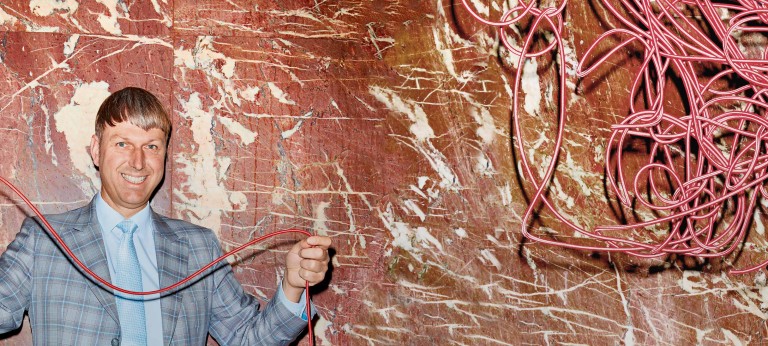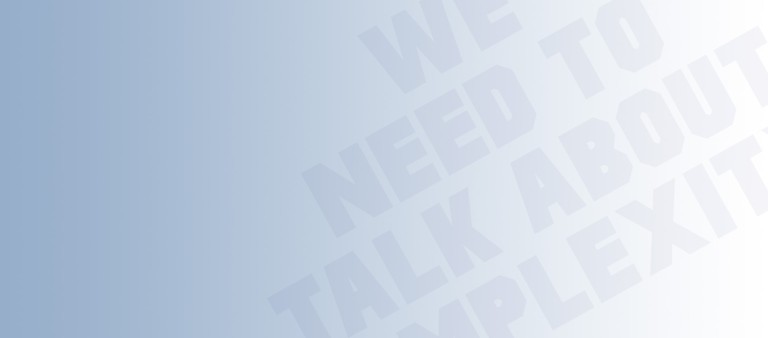Exploring complexity
![{[downloads[language].preview]}](https://www.rolandberger.com/publications/publication_image/roland_berger_think_act_magazine_navigating_complexity_cover_en_download_preview.jpg)
Don't miss our article with Nobel Prize winner Richard Thaler, as well as much more food for thought.


by Detlef Gürtler
photos by Norman Konrad
Computer scientist Dirk Helbing seems to have all the answers. His wide-ranging, free-thinking ideas focus on how to cope with those complexities of the modern world that could threaten our way of life. His solutions are bold: Get rid of as many links as possible and give everybody their own private investment funds.
We have the best technology and access to more and more data every day, but even so it seems that we are increasingly losing control over our world. Is that in spite of technological progress? Or because of it?
The problem is not technology – it's how we use it. While processing power is increasing exponentially, the data volume is growing even faster and the complexity of the world's systems is beyond reach. As we globalize the planet, we are increasingly connecting everything with everything else within one system. This creates a combinatorically exploding number of possibilities – and, in turn, a dramatic growth in complexity.
We have seen a lot of situations over the course of world history in which complexity increased, even exponentially, and most of the time the solution to cope with this growth in complexity was found in technology. The invention of the computer was a solution to the complexity problems of its time.
So what is the complexity problem of our time? We'll only find the right solution if we identify the problem. The problem we face today is over-connectedness: There are too many links. Technology can certainly be part of the solution, though we'll have to use it in a different way.
"You have to be courageous to experiment with new solutions, even if your cash cows are being challenged."
So, it's the internet's fault?
No, it's globalization's fault. Today's globalization paradigm has led us pretty much to over connected systems. We experienced this a decade ago when the global financial system collapsed: Having too many links in a system can create systemic risks. Highly connected interview conducted by "Detlef Gürtler" systems can be convenient and profitable most of the time, but this does not imply sustainability. If you don't have a sustainable system, people will die sooner or later.
A law limiting links might be rather difficult to implement…
A link tax might be better. Adding links to already over connected systems raises risks. If links were taxed, particularly long-term ones, people would think before they link: "What links are really important?"
Or they would relocate their server with links to a tax haven somewhere in the Caribbean?
That sounds a bit like a funny science fiction story. The elite is afraid of losing control, so they have an interest in fixing over complexity. Overall, I believe we need a new control paradigm.
A giant global control dashboard installed and operated by a German professor?
No way, just the opposite! The new control paradigm should leave degrees of freedom for local cultures, local innovation and local interaction. Not a one-size-fits-all solution, as the current globalization paradigm suggests. Rather, we need the paradigm of globalization: Think globally, but act locally.
So giving up control is the new control paradigm?
To some extent. We need a distributed control approach. Let me explain it with a seemingly simple example: traffic lights, a system used worldwide to control traffic flows. Each city has a lot of them, and to find the optimal control solution, a lot of parameter combinations must be checked out. There are so many possibilities that the optimization problem cannot be solved in real time, even with supercomputers. Therefore, authorities (traffic control centers) simplify the problem, for example by switching traffic lights in a periodic way based on typical traffic data and on a synchronization of the cycles. However, it turns out that as you do that, the best solutions – the non-periodic ones – are thrown away. Note that the variability of traffic flow is huge: The number of people arriving at a red light or turning right at a given intersection varies dramatically. So there is no "typical" traffic – a seemingly optimal control scheme is therefore created for a situation that never occurs.
Still, it's better than having no control.
But that's not the only alternative. We have found means of traffic light control that respond flexibly to actual traffic flow. So traffic flow controls the traffic lights rather than the other way round. That creates a flexible response to actual needs. And we have added a second mechanism to coordinate with neighboring intersections. If neighboring traffic lights are coordinated, this coordination can spread via self-organization throughout the entire city. This way you can combine higher flexibility with better performance. Amazing, isn't it?
In theory, or in reality?
The latter. The decentralized control approach outperforms classical top-down state-of-the- art control using a traffic control center. Additionally, control centers are vulnerable to electricity blackouts or communication downtime. Operation schemes based on self-organization would be adaptable, meaning resilient to perturbations and not dependent on any single node.
Dirk Helbing is professor of computational social science at ETH Zurich. He was one of the founders of the FuturICT Knowledge Accelerator project, an information and communication system to accelerate innovations and counter global threats.
This sounds a bit like the "small is beautiful" idea. We don't need the big systems. We can solve the complexity problem on a small scale, one traffic light at a time.
It's not really a matter of size – many of these principles are scalable. And that makes them suitable for really big and global systems. Take an anthill for example. It can include hundreds of thousands of ants – so it's not a small system. Ants are a species as successful as humans (measured in terms of biomass). Interestingly, both species – humans and ants – are social. But ants obviously don't have much intelligence. They operate on the basis of simple and decentralized principles.
But ants have queens, like bees.
But these queens don't command the workers. They lay eggs. The work process is based on simple interaction mechanisms that have been optimized by evolution over millions of years. In principle, you can run such evolutionary processes in a supercomputer to speed them up – that is actually what we are doing.
"Think:Act" readers don't command ant hills. They manage large, highly complex systems with global reach. Are they in danger of losing control?
They are facing an even bigger danger: that these control systems will become obsolete. Once you have built a global supply chain, you want to use it for 30 years or so. But information technology changes on a much faster time scale– and environmental and demographic conditions change as well. Suddenly you can produce stuff locally with 3D printers that can even print pharmaceutical pills or entire houses – at a much cheaper price. Suddenly there's a new production technology that doesn't require a huge global supply chain. I am sorry to say this, but many of those big global systems will be fundamentally…
…destroyed?
Let's rather say, "reinvented." Just look at the energy industry. There is a dramatic change from some big central power stations to a dense network of independent tiny energy producers. Some years ago, the energy business was boring – because you could not do anything wrong. Energy production was a reliable cash cow, almost like printing money. How dramatically that has changed! It's really important that we become much more adaptable, flexible and resilient. That needs different kinds of systems. You have to be courageous to experiment with new solutions, even if your cash cows are being challenged. If you don't dare to do it yourself, someone else will certainly do it.
5-10% of current R&D budgets could be pooled together to create a "European Media Lab" and challenge established ways of thinking
That's something that requires heroism. Being courageous, destroying your business model before someone else does it….
At least you should be prepared for this situation. Look at Kodak, for example. Kodak had worked extensively on digital cameras. They had a lot of patents in that field, but they were not able to transform themselves quickly enough, anxious about destroying their old business model – so someone else did it. A similar thing may now happen in the transportation sector. Outsiders and newcomers like Google, Tesla and Uber are revolutionizing this business completely. All legacy companies threatened by drastic change should do the following: Take 5-10% of the R&D budget and put these funds together with those of other companies to pay for something like a " European Media Lab" – a European network of digital labs run by a group of visionary thinkers who dare to challenge established ways of thinking and institutions, who dare to think 10, 20, 30 years ahead – as far as they can – without taboos. Let them do these things. Give them the freedom. Let them have fun. Don't try to influence them. And then watch the wonderful things that happen. Learn from them. Be the first to turn results that fit your company into new products, services and business models.
But wouldn't this lab be another big, central institution with global reach – like the ones you want us to get rid of?
Yes and no. No, because it would be like the queen ant. It doesn't command; it lays eggs. Yes, because it would still be still be far away from an ideal system, where money flows to the places where the best ideas are. At the moment, we have a system where some people have money and some people have ideas. In the end, there are only a few ideas that get funded, while all the others are buried and will never get anywhere.
So, you want all of us to have the chance to "lay eggs"?
Exactly. Now, here's the solution. I call it "investment premium." Technically, it would be like a conditional basic income that everyone gets. However, it would be money that you couldn't spend on yourself – you would have to give it to someone else, someone with great ideas or someone who engages with society. So, it would be like a kind of crowdfunding for everyone, or "democratic (venture) capitalism." Everyone would try to attract investment premiums by convincing people of their engagement and ideas. Some people might invest their premium in new technologies, others into neighborhood projects – planting trees, repairing streets, building kindergartens or makerspaces. People would have more opportunities to decide about the things that concern their own lives. There could also be a City Olympics to find the best solutions to energy, environmental, sustainability and climate problems and how they can be implemented. These measures would create a lot of innovation and could fundamentally transform our economy. We could all benefit from each other's ideas, all learn from each other – creating a paradise on Earth together, as much as that is possible.

![{[downloads[language].preview]}](https://www.rolandberger.com/publications/publication_image/roland_berger_think_act_magazine_navigating_complexity_cover_en_download_preview.jpg)
Don't miss our article with Nobel Prize winner Richard Thaler, as well as much more food for thought.
Curious about the contents of our newest Think:Act magazine? Receive your very own copy by signing up now! Subscribe here to receive our Think:Act magazine and the latest news from Roland Berger.
